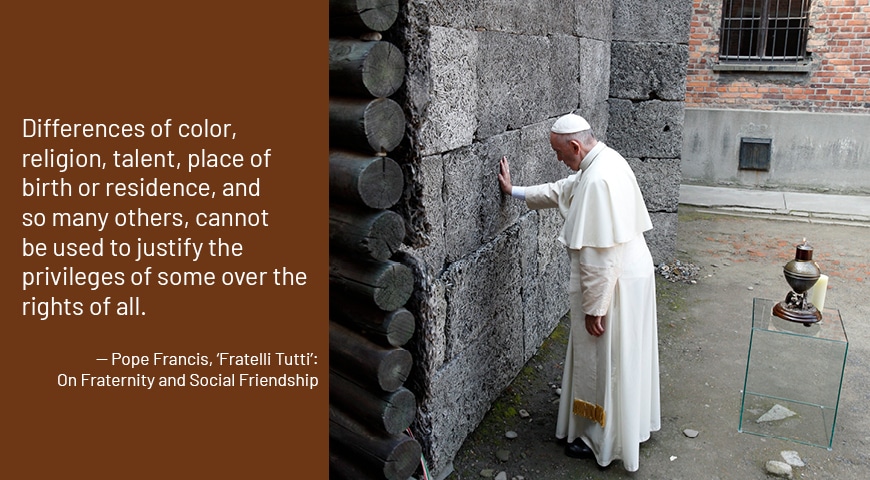Last January, we watched a rioting mob invade the US Capitol. In the days that followed many questions confronted us. What must we do to overcome such dangerous polarization? Is there guidance that we can adopt to serve as a unifying thread for the work needed to heal rifts, restore integrity, re-center truth? That guidance is at hand in “Fratelli Tutti.” Here are some clear examples of how much it meets our need for clear thinking leading to effective action.
“Dark Clouds Over a Closed World.” This ominous title for the first chapter warns us that we must take careful stock of the enormity of the crises we face. No shallow optimism, no despairing withdrawal can help. We must take time to understand the sources, the deeper rationale, the objective evidence for this global disease. Then, Pope Francis counsels:
“Together we can seek the truth in dialogue…. To do so calls for perseverance; it entails moments of silence and suffering, yet it can patiently embrace the broader experience of individuals and peoples” (50).

The third chapter proposes “Envisaging and Engendering an Open World.” Pope Francis appeals to us to move from isolated tribal or national circles to a universal “social friendship.” He is not peddling a papal utopian dream. He names concrete political and cultural implications: “The sum of individual interests is not capable of generating a better world for the whole human family. Nor can it save us from the many ills that are now increasingly globalized” (105).
“A Better Kind of Politics” (5) is “required reading” for anyone renewing commitment to responsible citizenship. It calls us to negate the harmful populism now on the rise and embrace a stance which he names “social and political charity.” Here he dares to insist that politics is the right place for “fundamental reform and major renewal” (179). This is a desperately needed affirmation. (Note: this document is intentionally directed to all persons of good will. It is not intended for an internal Catholic audience. It is, therefore, a perfect tool for interfaith cooperation in relation to our political future.)
The seventh chapter describes “Paths of Renewed Encounter.” Restoring lasting peace by way of thorough-going processes of reconciliation is its theme. Dedication to the goal of integral human development is core to this process as is the distinctive Christian demand that forgiveness serves as the condition of healing a society. In this, the pope draws from those dramatic examples of nations and communities that have demonstrated the capacity for such profound restoration of the common good.
This small sampling of the wisdom of this encyclical will, I hope, move readers to take up its proposals and carry them into the market place, the halls of government, the schools that we sponsor.

